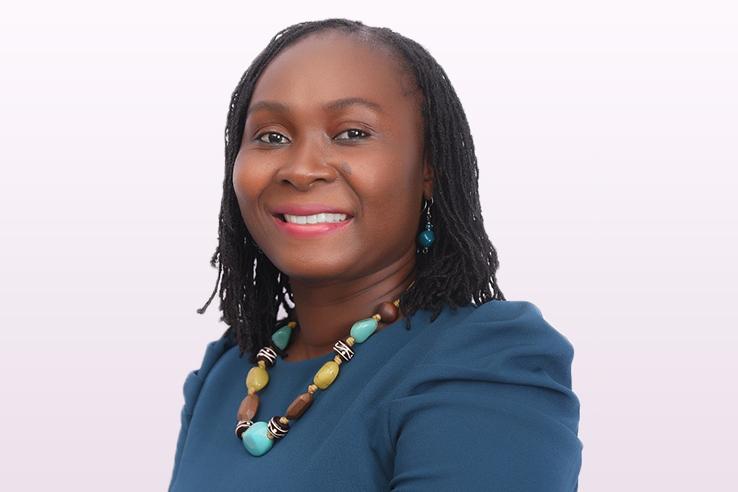African Scholar Spotlight: Dr. Monica Lambon-Quayefio

This post is part of our ongoing series showcasing the work and perspectives of economists from the African continent who are leading randomized evaluations.
In this post, we speak with Monica Lambon-Quayefio, a senior lecturer in the Department of Economics at the University of Ghana. Monica’s primary research interests include health economics, spatial econometrics, development, and experimental economics.
What drew you to the field of development economics and, in particular, working with impact evaluations?
The everyday issues I have been surrounded by growing up in Ghana—and even now— drew me to development economics. I was not always interested in impact evaluations; in graduate school, I started to focus on agricultural economics but was unable to write my thesis on my topic of choice due to data issues. As such, I veered into health economics and wrote my PhD thesis on women autonomy and child health outcomes.
When I finished graduate school, impact evaluations had started to become popular among development economists. I was fascinated and thought that they were a neat way to isolate the effects of different interventions. So, I started to look for fellowships to acquire the necessary skills to practice and implement impact evaluations myself. I was also fortunate to work with and receive the support of senior colleagues, such as Robert Darko Osei, at the University of Ghana.
My first time conducting an impact evaluation was with Christopher Udry on an agricultural finance project funded by the Center for Effective Global Action (CEGA). We were looking at testing the effectiveness of a digital finance tool to help smallholder farmers get access to finance to grow crops and increase profit. My experience taught me how to set expectations with implementing partners as well as the value of incorporating a qualitative component prior to the launch of a randomized evaluation to better appreciate the study context and ensure that it aligns with the research design.
What are your broad research interests?
My research interests primarily lie in agriculture, women’s empowerment, and children’s health. For instance, I am currently working with Edward Asiedu and BRAC USA on a food security project funded by J-PAL’s King Climate Action Initiative (K-CAI). We are studying how providing agricultural training to farmers on practices and technologies can help them adapt to climate change and improve productivity in Liberia.
In particular, our project is focused on examining the training’s differential impact on women, because they form a large base of the labor force. Furthermore, the country context of Liberia is unique in terms of gender dimensions because the war has caused women to outnumber men in the population, leading to women often being farmers and landowners.
One of your current projects was recently funded by J-PAL Africa’s Digital Identification and Finance Initiative. What research question are you trying to answer through this project?
I am using the funds to pilot an intervention on informal pensions in Ghana, where a sizable proportion of the population works in the informal sector. While workers in the formal sector typically earn pensions for retirement, workers in the informal sector usually have little to no retirement savings. Instead, they depend on financial support from their children and other family members, which is not a guaranteed source of income. Thus, my team wanted to study how an intervention could encourage workers in the informal sector to contribute to their own pensions over time.
The government of Ghana had recently permitted smaller pension companies to extend their services to people in the informal sector, so my research team partnered with an organization with this type of scheme, which was underutilized due to people’s lack of awareness. My team conducted a qualitative study using initiative funds before project implementation to gauge informal workers’ initial attitudes toward the pension scheme. Through this step, we better understood the issues at hand and adjusted the intervention accordingly.
Our first research question is to understand whether training sessions for informal sector workers can lead them to increase their pension contributions. Pension contributions are linked to individual's national identification cards (NID) so our intervention reminds participants of this link to increase their trust in the system. Our second question is to study whether training the participants about special features (relating to pauses or increasing contributions depending on income flow) could increase usage. The results will help inform how these pension schemes can be better designed in the future.
What are some other research projects that you’re most excited about?
I am a co-investigator, alongside Nkechi Owoo, on a project funded by J-PAL’s Jobs and Opportunities Initiative (JOI) to investigate personal motivation training and cultural norms surrounding women-owned businesses in Africa. African women face numerous cultural barriers to their business growth. These include spouses’ curfews, childcare obligations, and travel limitations. Training husbands could help them better understand the importance of business growth for their families, so I am conducting training modules to study the husband’s role in the growth of a woman-owned business.
I am also working with Edward Asiedu on another JOI-funded project to examine the effects of women’s social networks on their businesses. During the Covid-19 pandemic, we created a WhatsApp group for women where they could engage in knowledge sharing and networking related to their businesses. Results indicate that this intervention was highly cost-effective and showed that educational videos on business collaboration as part of the program reduced the likelihood of collaboration with friends and family and increased formal collaboration. Additionally, our preliminary findings show increases in innovation and profitability.
How can organizations like J-PAL continue to build on the support they provide to researchers based in Africa?
I appreciate how J-PAL’s pilot grants allow researchers to test ideas through a small-scale intervention, leading to a better understanding of the issues at hand and the appropriate program modifications. When I was a relatively inexperienced researcher, pilot grants felt more accessible compared to larger RCT grants. Having run three pilot projects now, I am confident in my ability to design interventions, identify threats, and test hypotheses. I find J-PAL’s pilot grant scheme to be helpful to African scholars.
Furthermore, I appreciate J-PAL’s occasional training sessions on impact evaluations. I am currently teaching impact evaluation to PhD students, and I will be receiving instructional support from Clare Hofmeyr, a training manager at J-PAL Africa, as part of J-PAL’s efforts in assisting African scholars with teaching this material.
One area J-PAL could continue to improve upon in its initiative funding model to African scholars is by covering costs upfront. Currently, initiatives require African researchers to pre-finance their projects, which can make implementation difficult if universities are unable to front the costs. Personally, I have seen this result in delays in award setup and funding.
Well noted—this is something we are trying to incorporate into our funding model. Do you have advice to offer other aspiring African scholars thinking about a career in economic research?
Knowing economic theory is different from applying economic knowledge, so I have found it helpful to seek opportunities to apply knowledge and get involved in projects. I am grateful to have worked on projects from design to implementation to analysis alongside Chrisropher Udry and experienced scholars at the University of Ghana. In short, my biggest piece of advice is, “Get your hands dirty!”
Monica Lambon-Quayefio is a Researcher and Lecturer in the Department of Economics at the University of Ghana. Her research interests include health economics, spatial econometrics, development, and experimental economics. Her recent work is focused on neonatal and infant mortality, as well as impact evaluations of remittances on savings and investment in education and asset accumulation. She teaches economics and other quantitative courses at the undergraduate and graduate levels. She has published articles in the Proceedings of the National Academy of Sciences, Journal of Demographic Economics, Review of Development Economics, and PLOS One.
Monica has received a number of fellowships including the Matasa Fellowship from Mastercard Foundation and Institute of Development Studies in the UK, Additional Insights International Research Fellowship from New York University, Structural Transformation of African and Asian Agriculture and Rural Spaces Fellowship from Cornell University, and the African Social Research Initiative Fellowship from the University of Michigan. She has also presented her research work at international conferences such as the PopPov, PEP, and UNU-WIDER.
Over the course of 2022 and 2023, J-PAL is publishing a series of blog posts that highlight the research interests and ongoing evaluations of researchers based in Africa who are working on issues related to poverty and economic growth. Each post will also showcase topics or unanswered questions researchers view as high-priority in their countries and regions, and highlight their advice for aspiring African researchers seeking a career in economics.
To hear more from Monica and meet other researchers based in Africa, watch the following video:

